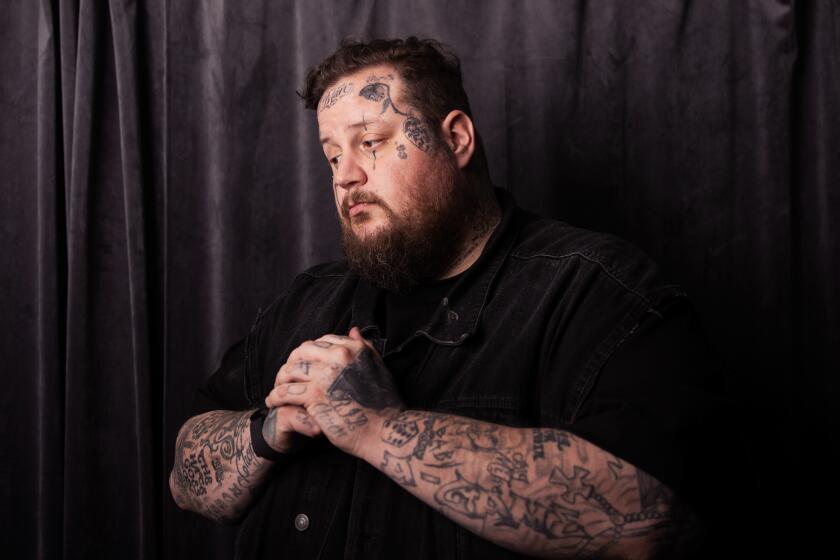‘I can’t speak for all POC,’ but Audie Cornish says she left NPR on good terms

- Share via
Audie Cornish, the outgoing co-host of NPR’s “All Things Considered,” is speaking out after her exit from the company made waves on social media this week.
Cornish announced Tuesday morning on Twitter that she was departing NPR’s flagship program to “stretch [her] wings and try something new,” becoming the latest journalist of color to leave the organization. Her pending exit — her last day on air is Friday — alarmed many online, including some of her colleagues, who called on NPR to do more to retain its talent.
Ari Shapiro, Cornish’s “All Things Considered” co-host, spoke up on Twitter Tuesday, saying the exodus of so many journalists is a “crisis” and NPR needs to “fix what’s broken.”
“It has been difficult this year to say goodbye to [David Greene, Lourdes Garcia-Navarro, Noel King, Shereen Marisol-Meraji] and more,” Shapiro wrote. “If NPR doesn’t see this as a crisis, I don’t know what it’ll take.”
By Thursday morning, Cornish seemed surprised by the reaction to her departure and the impassioned discourse it had stoked on social media.
“It seems my assumption that I would have a quiet transition was naïve. So I will attempt to provide whatever insight I can,” she wrote Thursday in another Twitter thread.
Cornish, who has worked at NPR since 2005 and began hosting in 2011, clarified her reasons for leaving and emphasized that she enjoyed her time at NPR and left with “no malice or resentment.” Still, she acknowledged that the recent departures of several colleagues — many of whom were also women of color — should be recognized as a cause for concern.
“I have had a great run with a company full of people I respect and admire,” she wrote Thursday. “And I am ready to try something new. I also understand that 4 hosts leaving in a year – three of them POC women– is a red flag as my co-host [Ari Shapiro] underscored earlier this week. I appreciate him taking it upon himself to raise it.”
Cornish said that while the experiences of Black and brown employees vary, they often share commonalities such as pay disparities and a feeling of not being heard. She stressed that many of these issues reverberate throughout the media ecosystem and should be treated as a whole rather than dissected separately.
Former producer Cerise Castle claims she experienced a pattern of racist behavior while working at KCRW. The station disputes some of her allegations.
“I can’t speak for all POC – but I want to be clear. I do not have to,” Cornish wrote. “Our experiences at the company vary and there are some common threads.
“Moreover some of these issues permeate the public media system — yes stations and yes your favorite podcast companies that have sprung from that system,” she added. “While the media reporting on this has been to treat each as a problem in isolation that is not the case.”
Lourdes “Lulu” Garcia-Navarro left NPR last September to anchor a new opinion podcast at the New York Times. After hearing the news of Cornish’s exit, Garcia-Navarro praised her former co-worker but said she wasn’t surprised.
A Martínez had a bumpy transition from Los Angeles sports radio to public radio. But after success at KPCC, he’s been named co-host of NPR’s “Morning Edition.”
“People leave jobs for other opportunities if they are unhappy with the opportunities they have and the way they have been treated,” she said. “I’m sad to see this happening but it is not unexpected.”
On Wednesday, Isabel Lara, chief communications officer at NPR, tweeted that the company is the “best audio journalism org in the country” and said many competitors had made a habit of snatching up their stars. She stressed that the nonprofit NPR struggled to compete financially with deeper-pocketed rivals, and instead had to rely on “creativity and mission.
“I’m proud & happy that WOC journalists are finally getting terrific offers & choices that used to be reserved for white men,” Lara wrote. “I’m also excited about the young people coming up the ranks: passionate about audio & our mission. We need to work on retention & growth paths for them.”
More to Read
The biggest entertainment stories
Get our big stories about Hollywood, film, television, music, arts, culture and more right in your inbox as soon as they publish.
You may occasionally receive promotional content from the Los Angeles Times.












